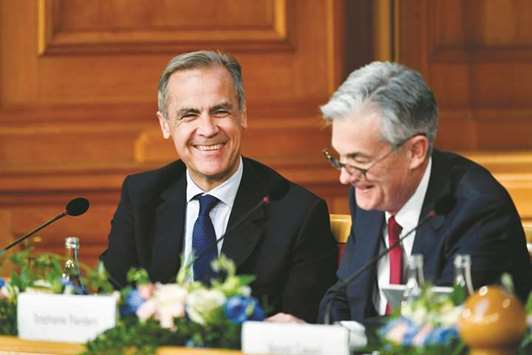Federal Reserve chairman Jerome Powell and other top central bankers defended their use of unconventional policies during and after the financial crisis, but said more work was needed before they could declare the experiments successful.
“The test is not over,” Powell said, less than three weeks before the Fed is expected to raise its policy interest rate for a seventh time since late-2015. “We haven’t normalised monetary policy. We haven’t seen the aftermath fully.”
Powell’s colleagues at a panel discussion in Stockholm agreed. European Central Bank Executive Board member Benoit Coeure said he would give a high grade to the actions the ECB took in the crisis to fight fragmentation of the eurozone.
But, he added, “when it comes to monetary policy and inflation, it’s too early to tell” how successful the policies have been. “That has to be assessed over a full cycle and we’re not there yet.”
The discussion took place at time when, Powell said, trust in public institutions, including central banks, was at “historic lows.” That’s part of a global surge in populism that contributed to the election victory of US President Donald Trump and has most recently propelled a euro-sceptic coalition to power in Italy.
Powell acknowledged that crisis-era policies central bankers adopted a decade ago may have contributed to the erosion of public trust in their institutions. Yet he also defended their use.
Tools such as large-scale asset purchases, he said, had “largely accomplished their purposes and largely didn’t produce the downsides that were widely predicted, such as very high inflation and unsustainably high asset prices and credit growth.”
The panel also included Bank of England governor Mark Carney and Agustin Carstens, head of the Bank for International Settlements, and marked the 350th anniversary of the founding of Sweden’s central bank. In earlier remarks Powell said central banks should not take their independence for granted.
Powell also addressed another unconventional tactic introduced during the crisis, the policy known as forward guidance, or the practice of explicitly telegraphing the direction or level of interest rates, sometimes for specific periods of time or until certain economic goals have been met.
“Forward guidance was highly useful in the crisis,” he said, adding “I think it will have a significantly smaller role going forward.”
Both Powell and Carney said their central banks may have to use unconventional policies again should interest rates return to zero in a future recession. Unless interest rates rise to a higher level before another downturn, “the BoE will potentially need to use non-standard tools,” Carney said.
Powell echoed that sentiment.
“Depending on the timing and the scale of the next downturn, whenever that comes, it may be that we push back to the zero-lower bound and may need to either resort to unconventional measures or have some fiscal support,” he said.

BoE governor Mark Carney (left) and Jerome Powell, chairman of the US Federal Reserve, react during a conference to celebrate the 350th anniversary of the Riksbank in Stockholm on Friday. Powell acknowledged that crisis-era policies central bankers adopted a decade ago may have contributed to the erosion of public trust in their institutions. Yet he also defended their use.
